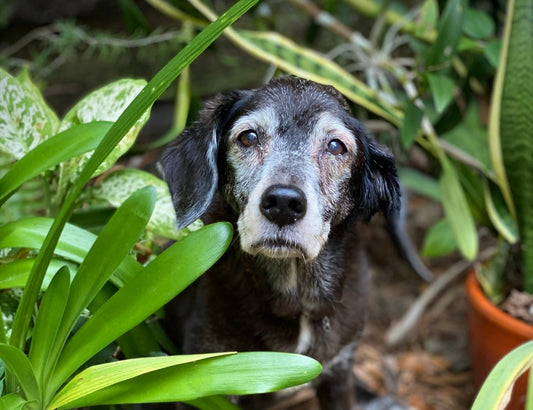When it comes to gut health, few pet parents fully understand the difference between prebiotics and probiotics or how they work together to support overall wellness. Let’s explore these two essential components of digestive health and how mushrooms can naturally help maintain your pet’s microbial balance.
Understanding the Microbiome
Your pet's gastrointestinal (GI) tract is home to a complex ecosystem of microorganisms known as the microbiome. This community includes bacteria, yeast, fungi, and other microbes. A balanced microbiome plays a key role in digestion, immune health, and overall vitality.
Probiotics: The Essential “Good” Bacteria
Probiotics are the beneficial bacteria that help maintain a healthy gut environment. They play a role in supporting immune function, promoting calm behavior, and helping to keep the digestive system in balance.
Probiotic-rich foods or supplements may help maintain this microbial harmony, especially during times of stress, dietary changes, or aging. Look for natural sources like raw goat milk, fermented vegetables, or functional mushrooms to provide a variety of helpful strains.
Prebiotics: Nourishment for Probiotics
Prebiotics are non-digestible fibers that act as food for probiotics. They help beneficial bacteria thrive and maintain their function in the gut. While some commercial products use sugar-based prebiotics like fructooligosaccharides (FOS), there are other whole-food options that may be more appropriate for pets.
Natural sources such as inulin, Jerusalem artichoke, and certain types of fiber-rich mushrooms provide a gentle and effective way to support probiotic activity without introducing excess sugars.
However, we believe one source of prebiotics stands above them all– MUSHROOMS!

The Role of Mushrooms in Gut Health
Mushrooms are gaining recognition for their ability to support the gut through a dual role: they contain both prebiotic fibers and natural compounds that contribute to microbial balance. Many varieties, including Lion’s Mane, Turkey Tail, Chaga, and Shiitake, contain polysaccharides and beta-glucans that may help maintain intestinal health.
These functional mushrooms offer a natural way to support:
- A healthy digestive system
- Microbial diversity
- Intestinal barrier integrity
- Nutrient absorption
- Immune system modulation
Digestive Support from MycoDog Digest
Digest by MycoDog combines several of these functional mushrooms with time-honored adaptogens to provide a daily wellness formula for gut health. The blend includes:
- Lion’s Mane: Supports microbial balance and healthy cognitive function
- Chaga: Aids in nutrient absorption and overall digestive wellness
- Turkey Tail & Shiitake: Help maintain a healthy gut barrier and support immune function
- Astragalus: Traditionally used to support immune health and gastrointestinal function
- Ashwagandha: Known for promoting a healthy stress response and digestive comfort
- Rhodiola: Supports enzymatic activity and overall vitality
This synergistic combination helps maintain digestive health naturally, using ingredients that support the gut ecosystem without overwhelming it.

Supporting Gut Health Naturally
By incorporating mushroom-based ingredients into your pet's routine, you can help nurture a healthy gut environment and support long-term well-being. These powerful fungi work in harmony with the body, promoting balance and resilience from the inside out.
About Krysta Fox

She has also previously taken on several roles within the industry, including the formulation, manufacture, and sales of raw pet food as well as consulting on animal health and nutrition. With her combined veterinary and pet industry knowledge, she can effectively help almost anyone she comes across in some way regarding their pets’ health. When she’s not working to help educate pet parents, she enjoys horseback riding and spending time with her husband, family, and friends.
Disclaimer
These statements have not been evaluated by the Food and Drug Administration. This content is for informational purposes only and is not intended to diagnose, treat, cure, or prevent any disease. Always consult with a qualified veterinarian before making changes to your pet’s wellness routine.




